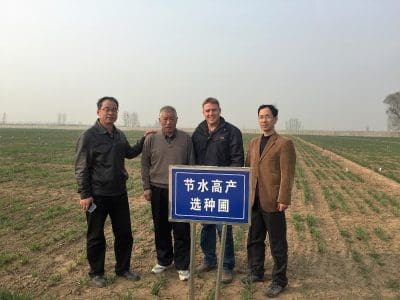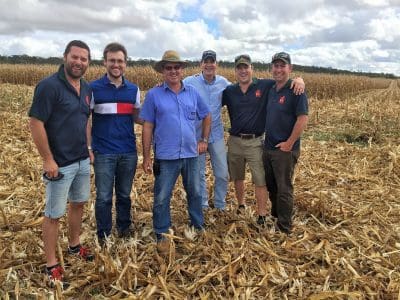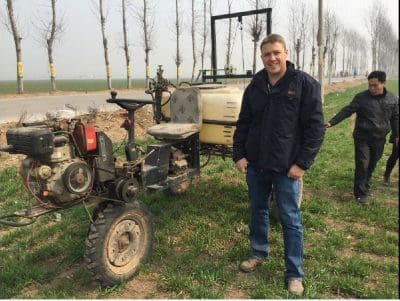RECORD breaking floods in 2010 and 2012 on Adam McVeigh’s irrigated farm in the South Burnett, Queensland, provided the cotton and grain grower with a lasting impression of the need to minimise the devastating financial impact of crop loss and farm damage from natural disaster.

Adam McVeigh (second from right) with Professor Weili Lang and associates visiting the ‘National Agricultural Science and Technology Zone’.
It also led him to develop a resilient double cropping program, which was not only financially safe but also profitable.
A Nuffield Scholarship provided the ideal opportunity to further research and develop this system.
Double cropping can provide biannual income and typically lower and more evenly spread input costs, which the 2015 Nuffield Scholar saw as the way to achieve effective management of risk and profitability, which he said is the key to success in farming.
“For irrigators who are farming in regions that are vulnerable to crop destruction from natural disasters like flooding, achieving high yields from double cropping with centre point irrigation can be a sustainable long-term cropping option,” he said.
“My Nuffield research looked further into this program, as well as cropping techniques, considerations farmers make when choosing rotational crops as well as the design and operation of centre pivots.”
Mr McVeigh said rainfall variability and increasing environmental demand coupled with legislative changes has driven massive innovation and advancements in Australian irrigation practices over the past 20 years.
“This has resulted in significant increases to the area irrigated with centre pivot and lateral move systems, with the two leading factors driving the adoption of these systems being labour and water savings,” he said.
“Farm businesses often have high debt levels because they are just starting out or are recovering from a natural disaster, so their capacity for risk is low.
“That means one of the key priorities of my research was to provide information to assist farmers with a low-risk capacity to plan a high yield, double cropping rotation for their centre pivot irrigation.
“I believe consecutively producing two crops on the same land, within the same growing year can increase cash flow, and I have found that it is actually common practice in many parts of the world.”
Mr McVeigh’s Scholarship was sponsored by the Grains Research and Development Corporation, and allowed him to visit England, France, Belgium, USA, Germany, Czech Republic, Poland, Kenya, South Africa, Brazil, Canada, China and Hong Kong.
“The extraordinary opportunity presented by a Nuffield Scholarship has allowed me to access the best information for my research, but also to agricultural leaders, researchers, farmers, educators and other networks around the world which has given me an excellent insight into the diversity of agriculture and the people involved in the industry,” he said.
“Many regions around the world practice double cropping, including China, where growers have been successfully double cropping irrigated wheat and corn for 40-50 years, showing that it can be sustainable over long periods.
“Brazilian farmers are currently double cropping, with excellent yields, however the tropical climate and cropping frequency are putting the system under constant threat from pests and disease.
“This highlights the need to manage the available genetic and chemical pest and disease control technology wisely to prevent the build-up of resistance.”
Mr McVeigh said careful planning that started with the initial design of an irrigation development was crucial to achieve the highest yields and lowest input costs which ultimately led to the highest financial return per hectare.
“Poorly designed systems will limit cropping options and potential yields, and can also increase operating costs,” he said.
“Employing an experienced consultant to help identify potential design or management issues during the planning phase will be significantly more cost effective than trying to rectify poor designs after installation.
“Producing continuous high yields with double cropping can be sustainable providing the centre pivot irrigation system has been designed well. Farmers must also consider their exposure to risk, gross margins, residue management, nutrient management, integrated pest management, equipment and its proper operation.
“Ultimately my report informs readers of some of the key considerations for designing centre pivot irrigation infrastructure, and also some practical farming techniques that aid in achieving maximum yield potential. It also outlines the importance of understanding risk capacity and the impact that this should have on crop rotation choices.”
…………..
Nuffield Australia provides opportunities to Australian primary producers and managers to travel the globe investigating a research topic important to them and Australian agriculture. Scholars are provided with a $30,000 bursary to embark on a 16-week program consisting of both group and individual travel over a two-year period. The application period opens on April 1 2017. Website: www.nuffield.com.au





HAVE YOUR SAY